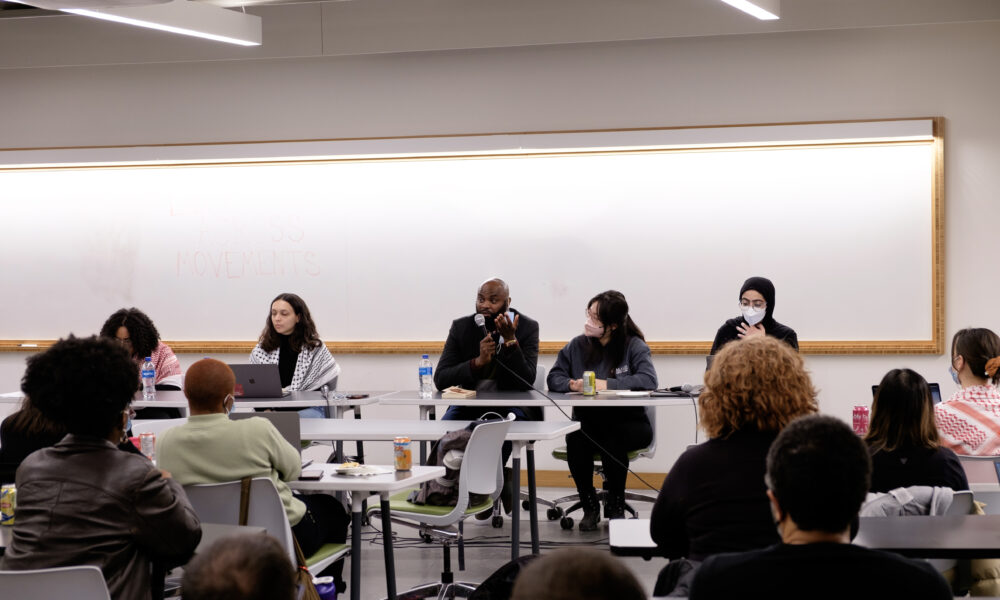RadLaw McGill and Law Students for Palestine at McGill (LS4PM) hosted a community panel called “Liberation Across Movements: Palestine, Sudan, and Congo” on the evening of Feb. 24 in the New Chancellor Day Hall at the McGill Faculty of Law. The event rose out of a recognition of the need for solidarity amid the ongoing atrocities unfolding in Palestine, Sudan, and the Democratic Republic of the Congo (DRC).
The bilingual event featured three community speakers who did teach-ins on each respective conflict, followed by a discussion and audience question period.
RadLaw and LS4PM member Fatima—a third-year Law student and first-generation Canadian from South Lebanon whose ancestors are from occupied Palestine—facilitated the event. It featured Duha Elmardi, a Sudanese organizer from the volunteer-based Sudan Solidarity Collective, Reem Said, one of the founding organizers of Montreal’s chapter of the Palestinian Youth Movement, and Patrick Mbeko, a Canadian geopolitical analyst of Congolese origin and author of many works specializing in Central Africa.
The event began around 6 p.m. with a land acknowledgment by Fatima, who highlighted the importance of solidarity with Indigenous resistance and the role of pervasive anti-Blackness.
“Anti-Blackness is a global issue with regards to systematic erasure of Black bodies, and the valuation of who’s deemed worthy of sympathy,” Fatima said.
Fatima encouraged the audience to engage with Quid Novi, the student-led journal at McGill’s Law School, where Black law students recently made a statement on the interconnectedness of Black and Palestinian liberation struggles.
Next, each speaker provided the most critical context or background of their respective conflict.
Mbeko stated that the spillover of the conflict in neighbouring Rwanda in 1994 led to the first and second Congo wars in 1996 and 2003, respectively, resulting in the death of over six million people. He noted that while this conflict continues, Western powers exploit the mineral-rich eastern region of the DRC.
“It reminds us what is happening today in Palestine. Where they say, we want a humanitarian pause but refuse a permanent ceasefire while people are being murdered. It’s the same logic that is being applied to the DRC today,” Mbeko said.
Following Mbeke, Said spoke, situating the ongoing atrocities in Palestine within the larger historical conditions of the region and highlighting the role of geopolitical interests that have led to the ongoing siege beginning Oct. 7.
“We must understand Palestine through a materialist framework,” Said said. “That means that the genocide that we’re witnessing today is happening because of historical struggles over land and resources, and this is related to imperialist interests, and geopolitical goals in the region.”
Then, Elmardi provided an overview of the events and conditions leading up to the ongoing war in Sudan when fighting broke out between the Rapid Support Forces (RSF) and Sudanese Armed Forces (SAF) in the capital, Khartoum. Elmardi noted that the war began on April 15, 2023, but is rooted in the National Islamic Front’s coup in 1989, as well as colonial legacies from British rule. Khartoum remains an active warzone, there is a media blackout and a lack of domestic accountability.
“There was a lot of coverage because they were evacuating all of the diplomats, NGO workers, and foreigners in the country,” Elmardi said. “As soon as the evacuations ended it’s no longer mainstream and very difficult to find news about Sudan.”
The discussion then turned to a question-and-answer period. All three speakers highlighted how the conditions under which genocide and colonialism in their respective countries have unfolded should act as a guide for solidarity.
“The imperialists are united, and so the people that are living under imperialism must unite as well,” Said said.
Mbeko underscored the level of humanity required in maintaining solidarity across movements, and in determining how we articulate and defend ourselves.
“Everyone needs to understand what is happening. I said it earlier, but today, I feel Palestinian, I feel Sudanese, I feel Quebecois, I feel whatever you want. I am a citizen of the world and I refuse the categorizations that the media presents us, because they are a part of the same imperialist system.”
*Mbeko’s quotes have been translated from French by the author.
This piece was updated at 4:57 p.m. on Feb. 27.








